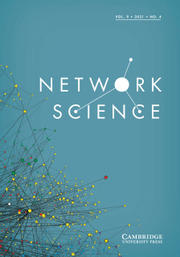Article contents
Egonets as systematically biased windows on society
Published online by Cambridge University Press: 03 April 2020
Abstract
A person’s egonet, the set of others with whom that person is connected, is a personal sample of society which especially influences that person’s experience and perceptions of society. We show that egonets systematically misrepresent the general population because each person is included in as many egonets as that person has “friends.” Previous research has recognized that this unequal weighting in egonets leads many people to find that their friends have more friends than they themselves have. This paper builds upon that research to show that people’s egonets provide them with systematically biased samples of the population more generally. We discuss how this ubiquitous egonet bias may have far reaching implications for people’s experiences and perceptions of frequencies of other people’s ties and traits in ways that may influence their own feelings and behaviors. In particular, these egonet biases may help explain people’s tendencies to disproportionately experience and overestimate the prevalence of certain types of deviance and other social behaviors and consequently be influenced toward them. We illustrate egonet bias with analyses of all friends among 63,731 Facebook users. We call for further empirical investigation of egonet biases and their consequences for individuals and society.
Keywords
Information
- Type
- Research Article
- Information
- Copyright
- © Cambridge University Press 2020
Footnotes
Special Issue Editors: Brea L. Perry, Bernice A. Pescosolido, Mario L. Small, and Ann McCranie
References
- 8
- Cited by

